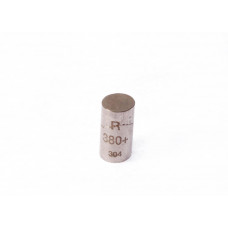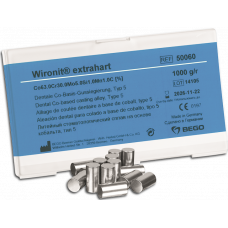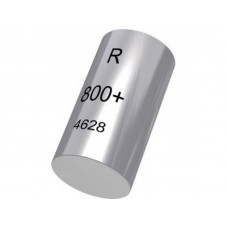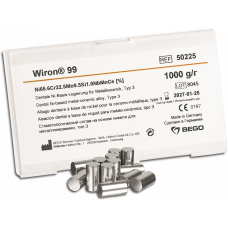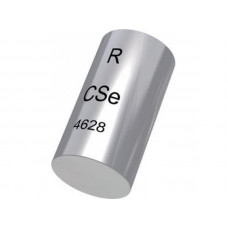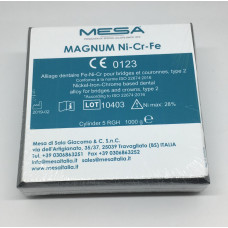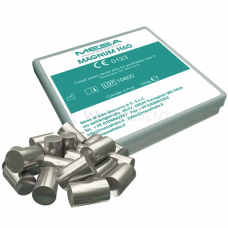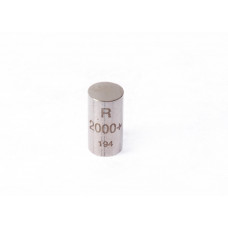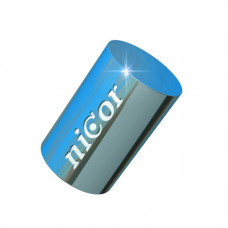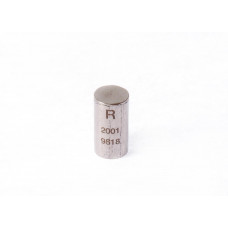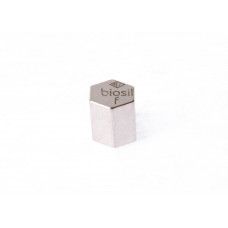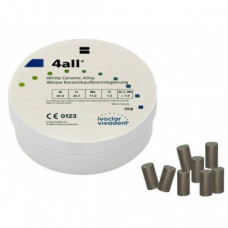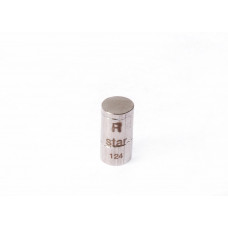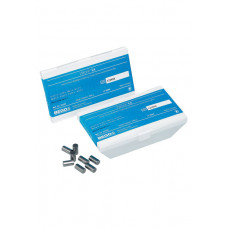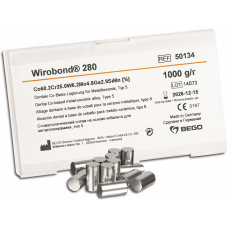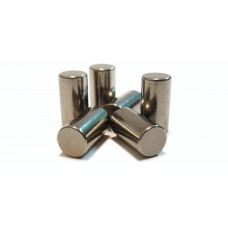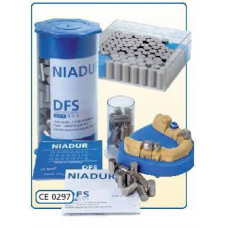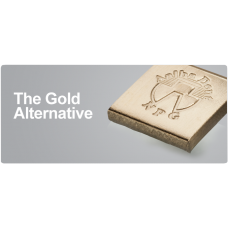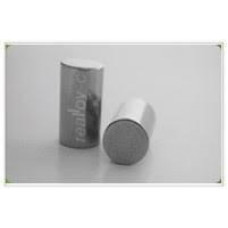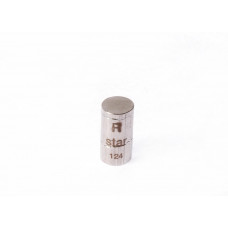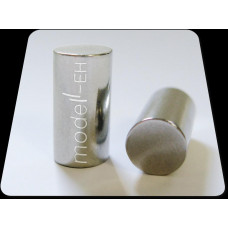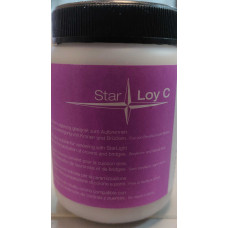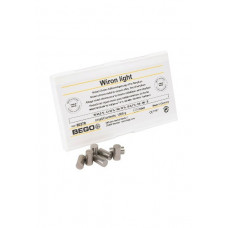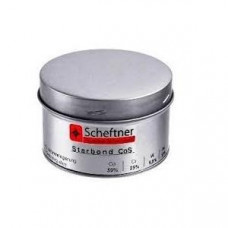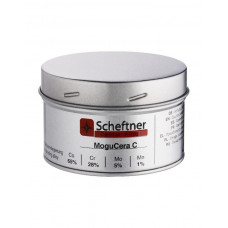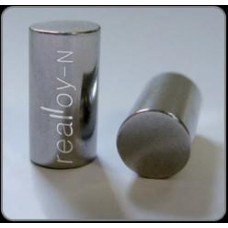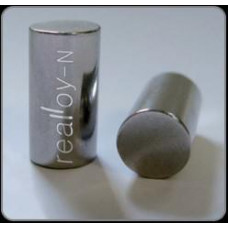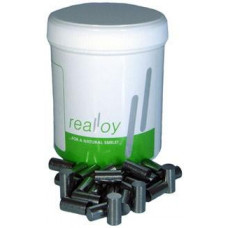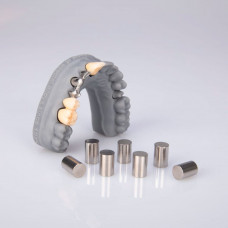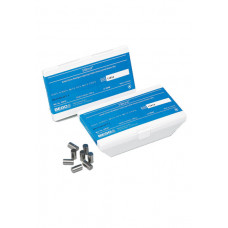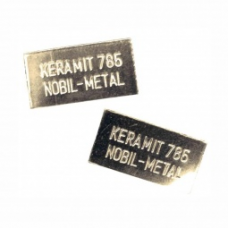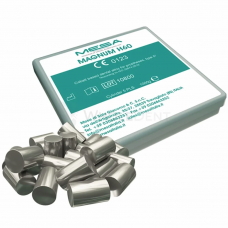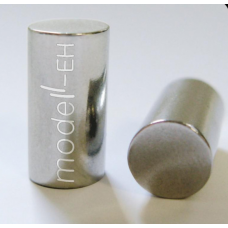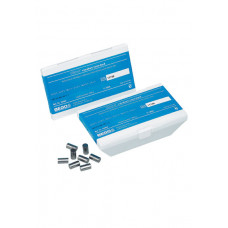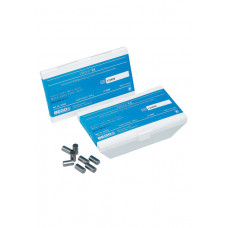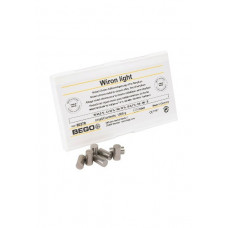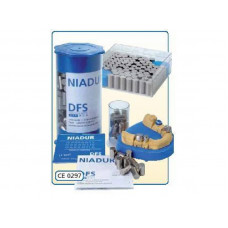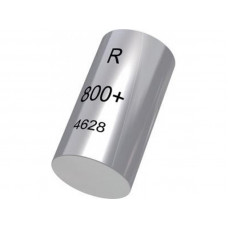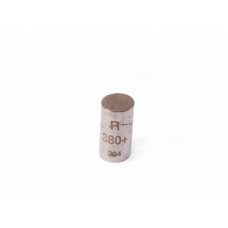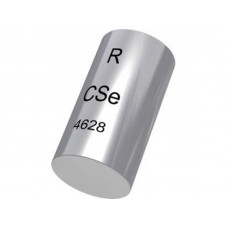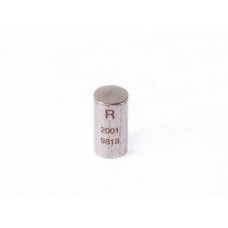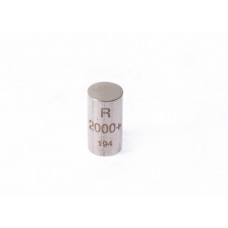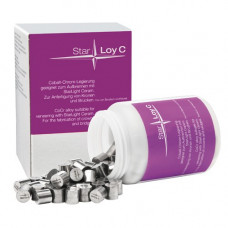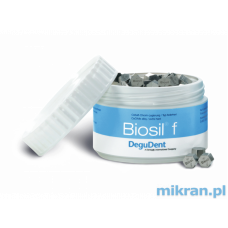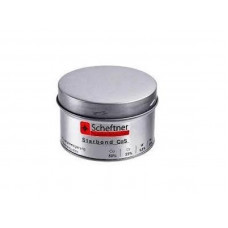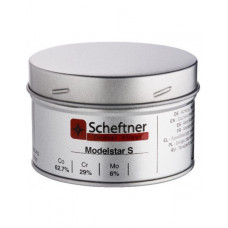Remanium GM 380+ 1 piece
Remanium GM 380 + for making standard, high-strength structures. Universal use in the technique of partial dentures.
Chemical composition:
- Every 64.6%
- Cr 29%
- Mo 4.5%
- other SI,Mn,N,C.
- Initial melting point 1300 °C.
- Final melting point 1370 °C.
Packaging:
- 1 piece.
Wironit extrahard - 1 piece BEGO
Wironit extrahard ideal alloy for casting elements of combined works.
Characteristics:
- Percent composition by weight Co - 63.0 Cr - 30.0 Mo - 5.0 Si,Mn,C < 2.
- Density 8.2g/cm3.
- Melting range 1260-1305 °C.
- Casting temperature 1420 °C.
- Elongation at break (A5) 4.1%.
- Tensile strength (Rm) 910 {MPa}.
- Yield strength (Rp 0.2) 625{MPa}.
- Modulus of elasticity 225{GPa}.
- hardness acc. Vickers (HV10) 375.
Packaging:
- 1 piece
Remanium GM 800+ 1 cube
Remanium GM 800 + alloy for casting partial dentures. The mirror shine of the molten metal allows you to determine the right moment for pouring.
Characteristics:
- The alloy has high resistance to fracture thanks to its excellent physical properties.
- A high modulus of elasticity allows you to obtain delicate, yet stable structures.
- Reduced hardness facilitates processing and polishing.
- High surface gloss after electrolytic polishing.
- Perfect for laser welding.
Chemical composition:
- Every 63.3%.
- Cr 30.0%.
- Mo 5.0%.
- Si 1%.
- MN,C,N.
Parameters:
- Yield strength Rp 0.2 - 720 MPa.
- Tensile strength Rm - 960 MPa.
- Hardness HV 10 - 370.
- Total elongation after tearing A5 - 6.0%.
- Young's modulus - longitudinal elasticity coefficient - 230,000 MPa.
- Density - 8.2 g/cm3.
- Temp. initial melting - 1240 degrees C.
- Temp. final melting point - 1410 degrees C.
Packaging:
- 1 pc. / approx. 6g
Wiron 99 1 piece
Wiron 99 base alloy for firing ceramics or for facing with plastics.
Characteristics:
- Does not contain beryllium.
- Extremely resistant to corrosion.
- High strength at any span.
- High modulus of elasticity.
Percentage composition by weight:
- Ni 65.0
- Cr 22.5
- Mo 9:5
- Nb,Si,Ce < 0.02
Alloy characteristics:
- Silver color.
- Density - 8.2 g/cm3.
- Melting temperature range - 1250-1310 C.
- Casting temperature approx. - 1450 C.
- Expansion coefficients in { 10- 6K- 1}.
- 25- 600 C - 14.0.
- 25- 500 C - 13.8.
- Elongation at break (A5) - 25%
- Yield strength (Rp 0.2) - 330 {MPa}
- Tensile strength (RM) {MPa} - 650.
- Modulus of elasticity approx. - 205.
- Hardness acc. to Vickers (HV 10) after firing - 180.
Packaging:
- 1 piece.
Remanium CSe 1 cube
Remanium CSe alloy of the latest generation for ceramics in the crown and bridge technique.
Characteristics:
- Very good ceramic adhesion, even after several firings.
- Contains no beryllium, biologically compatible.
- Resistant to corrosion in the mouth.
Chemical composition:
- Ni 61%.
- Cr 26%.
- Mo 11%.
- Si 1.5%.
- Co,Fe,Al,Ce <1%.
Technical data:
- Yield strength Rp0.2 - 340 MPa.
- Tensile strength Rm - 580 MPa.
- Hardness HV 10 - 195.
- Total elongation after tearing A5 - 15%.
- Yung modulus (longitudinal elasticity coefficient) - 170,000 MPa.
- Density - 8.2 g/cm3.
- WAK (25- 500 C) 14x10- 6K- 1.
- Initial melting point - 1280 °C.
- Final melting point 1350 °C.
Packaging:
- 1 piece
Magnum steel chrome-nickel-iron (Ni-Cr-Fe)
Nickel-chrome prosthetic alloy, non-precious, for cast crowns and bridges veneered with acrylic or composite. Chromium-nickel steel enriched with molybdenum allows the use of all known methods of melting. The best results can be achieved by melting the alloy in the casting machine with high or medium frequency current. An oxy-acetylene torch or an electric arc can also be used.
Composition in percent:
- Ni - 27%.
- Cr - 22%.
- Fe - 42%.
- Si - 4%.
- Mo - 3%.
- Other - C, Mn, Cu.
Melting temperature range:
- 1333 - 1380 °C
temp. casting:
- 1420 °C
Packaging :
- 1 piece.
Magnum H 60- 1 cube (formerly H75)
Magnum H60 steel, a dental alloy for cobalt-based skeletal dentures.
Characteristics:
- temperature of solidus-liquidus curves - 1321-1407 ° C
- melting point - 1460 ° C
- Vickers hardness - 394 HV 10
Chemical composition:
- Every 63%.
- Cr 29%.
- Mo 6.5%.
- other C, Si, Fe, Mn.
Package:
- 1 piece.
Remanium 2000+ 1 cube
Remanium 2000 + alloy has excellent physical properties due to continuous casting production.
Application:
- Crowns and bridges.
- Telescopic crowns.
- Prosthetic restorations on implants.
- Glued bridges.
- Secondary elements in skeletal prostheses (combined works).
- The alloy does not require oxidation.
Chemical composition in %:
- every 61st
- Cr 25.
- Mo 7.
- In 5.
- Si 1.5.
- Mn,N < 1%.
Technical data :
- Yield strength Rp 0.2 - 700 MPa.
- Tensile strength Rm - 900 MPa.
- Hardness HV 10 - 340.
- Total elongation at break A5 - 7.0%.
- Young's modulus (modulus of elasticity) - 200,000 MPa.
- Density - 8.6g/cm3.
- WAK 25- 500 C 14x10- 6K- 1.
- Initial melting point - 1325 °C.
- Final melting point - 1415 °C.
Packaging:
- 1 piece.
Nicor NiCr alloy for substructures of crowns and bridges veneered with ceramic 500g
Nicor-NiCr alloy for substructures of ceramic-faced crowns and bridges.
- The material has very good flow properties and high thermal stability.
- Suitable for casting thin layers.
- Strong metal-to-ceramic bond.
Properties:
Vickers hardness 280 HV 5
0.2 yield point 550 N/mm2
Elongation at break approx. 25%
Thermal expansion coefficient (25-600°C) 14.1 x 10-6K-1
Melting range 1260-1350°C
Density 8.2g/cm3
Composition: Ni 62%, Cr 26%, Mo 11%.
Packaging:
- 500g
Remanium 2001
Remanium 2001 porcelain alloy. It is especially suitable for melting with an oxygen propane burner. Easily processed, soldered, welded, eroded and milled. Corrosion resistant. Free of nickel, beryllium and iron.
Chemical composition in%:
- Every 63%
- Cr 23%
- Mo 7.3%
- In 4.3%
- Si 1.6%
- Mn, N <1%.
Technical data:
- Yield point Rp0.2 - 660 MPa.
- Tensile strength Rm - 850 MPa.
- HV hardness 10 - 336.
- Total elongation after rupture A5 - 5.5%.
- Young's modulus (modulus of elasticity) - 195 GPa.
- Density - 8.6 g / cm3.
- WAK 25- 500 C - 14.2x10- 6K- 1.
- Initial melting temperature - 1325 degrees C.
- Final melting temperature - 1415 degrees C.
Package:
1 piece.
Biosil F 1 piece
Biosil F is a flexible chrome-cobalt prosthetic alloy for casting frame dentures. Thanks to its exceptional elasticity, it is recommended for skeletal work with long arms of retention clasps.
Characteristics:
- Composition: Co - 64.8%, Cr - 28.5%, Mo - 5.3%, Si - 0.5%, Mn - 0.5%, C - 0.4%.
- Melting point: 1320- 1380°C.
- Pouring temperature: 1500 °C.
- Mold heating temperature: 1000 °C.
- Vickers hardness: 400 HV 10.
- Tensile strength: 900 N/mm².
- Destruction limit: 5%.
- Density: 8.4 g/cm³
- Yield strength: 700 N/mm².
- Modulus of elasticity: 220 GPa.
Packaging:
- 1 piece.
4 ALL nickel-chromium alloy for ceramics 1000 g
4 All nickel-chromium alloy for ceramics.
Characteristics:
- White color.
- Compatibility with feldspathic and low-melting ceramic materials.
- Easy casting and machining.
- Reduced hardness.
- Biocompatibility with tissues.
Indications:
- Single crowns.
- Telescopic and conical crowns.
- Bridges with short and long spans.
- Crown and root posts.
Composition:
- Ni 61.4%.
- Cr 25.7%.
- Mo 11.0%.
- Si 1.5%.
- Mn<1.0,Al<1.0%.
Technical data:
- Density (g/cm3) - 8.4.
- Melting point range (°C) - 1260- 1350.
- Coefficient of linear thermal expansion 25- 500(x10- 6/°C ) - 13.8, 20- 600(x 10- 6/°C ) - 14.1.
- Elongation (%) - 12.0.
- Hardness on the Vickers scale - 235.
- Yield strength (elongation 0.2%) (MPa) - 375.
Packaging:
- 1 kg
Remanium Star 1 piece
Remanium Star alloy for ceramics with extremely low hardness. Universal use: crowns and bridges, telescopic crowns, prosthetic restorations on implants, bonded bridges, secondary elements in skeletal dentures (combined works).
Chemical composition in %:
- Every 60.5.
- Cr 28.
- In the 9th
- Si 1.5.
- Mn,N,Nb < 1.
Technical data :
- Yield strength Rp 0.2 - 620 MPa.
- Tensile strength Rm - 845 MPa.
- Hardness HV 10 - 280.
- Total elongation after tearing A5 - 10.2%.
- Young's modulus (longitudinal elasticity coefficient) - 190,000 MPa.
- Density - 8.6g/cm3.
- WAK 25- 500 degrees C 14.1x10- 6.
- Initial melting point - 1320 ° C.
- Final melting point - 1420 °C.
Packaging:
- 1 piece.
Wironit LA Cr-Co - 1 piece
Co-Cr alloy for clasp prostheses and combination works.
Chemical composition:
- every 63.5
- Cr 29
- Mo:5.0
- C max 0.25
- Other: Si, Mn
Alloy characteristics:
- Density [g/cm3] 8.2
- Vicker hardness (HV 10) 360
- Yield strength (Rp 0.2) 640
- Tensile strength (Rm) 940
- Elongation at break (A5) [%] 8
- Flexibility modulus approx. 220,000
- Melting range [°C] 1340-1300
- Casting temperature [°C] 1450
Packaging:
- 1 piece
Wirobond 280 1 piece
Wirobond 280, a base alloy of the highest quality for metal-ceramics or acrylic veneering, does not contain nickel and beryllium.
Characteristics:
- Extremely resistant to corrosion, thanks to the optimal interaction of the two basic elements chromium and molybdenum.
- Low heat conduction.
- It combines well with ceramics.
Percentage composition by weight:
- Co 60.2, Cr 25, W 6.2, Mo 4.8, Ga 2.9, Si,Mn<2
Packaging:
- 1 piece
4 ALL stop niklowo-chromowy pod ceramikę 250g
4 All stop niklowo-chromowy pod ceramikę.
Cechy:
- Biały kolor
- Zgodność ze skaleniowymi i niskotopliwymi materiałami ceramicznymi.
- Łatwe odlewanie i obróbka.
- Zredukowana twardość.
- Biozgodność z tkankami.
Wskazania:
- Pojedyncze korony.
- Korony teleskopowe i stożkowe.
- Mosty z krótkimi i długimi przęsłami.
- Wkłady koronowo- korzeniowe.
Skład:
- Ni 61.4%.
- Cr 25.7%.
- Mo 11.0%.
- Si 1.5%.
- Mn<1.0,Al<1.0% .
Dane techniczne:
- Gęstość ( g/cm3) - 8,4.
- Zakres temperatury topnienia (°C ) - 1260- 1350.
- Współczynnik liniowej rozszerzalności cieplnej 25- 500(x10- 6/°C ) - 13,8, 20- 600(x 10- 6/°C ) - 14,1.
- Wydłużenie ( % ) - 12,0.
- Twardość w skali Vickersa - 235.
- Granica plastyczności ( wydłużenie 0,2% ) ( MPa ) - 375.
Opakowanie:
- 250g
DFS Niadur Cr-Ni metal for porcelain
High-quality metal for both single points and complete jobs. It pours very well.
(metal recommended for working with ceramics: Ivoclar-Vivadent, Vita, Kiss, Hera-Ceram.)
Chemical composition:
- Ni 62%
- Cr 24.5%
- Mo 10.3%
- Si 1.7%
- Fe 1.5%
Physical data:
- Density: 8.3 g / cm3
- Melting range: 1313-1350 C
- Casting temperature: 1500 C
- Elongation at Break: 16%
- (20-600 C) CTE: 14.5 µm / mK
Package:
- 1 cube (from 6g)
NPG alloy bag / 50g.
Application:
- fully cast crowns (FMC),
- single points,
- outlays,
- multi-unit short span bridges,
- metal frameworks for crowns veneered with polymer resins (acrylic and composites),
- inserts and substructures.
Physical properties:
- Tensile strength psi (MPa) - 81 200 (560)
- Plasticity, psi (MPa) - 38,425 (265)
- Percentage of elongation - 15
- Vickers hardness HV1 - 140
- Density g / cm3 - 7.8
- Color - Yellow Gold
- Melting range ° F (° C) - 1850-1950 (1012-1068)
- Type - Type 2
Chemical composition:
- Cu 80.7%
- Al 7.8%
- Ni 4.3%
- Fe, Zn, Mn
Package:
- 50g
Realloy C Nickel-free alloy for ceramics 1 cube
Realloy-C
Features:
- Universal cobalt chrome alloy compatible with all conventional ceramics.
- High quality
- Perfect combination with ceramics
- Cast by all melting methods
- Easy finish and easy to polish after pouring
- Also suitable for laser welding
- Easy removal of oxide after firing the ceramic
- Biocompatible
Composition:
- Every 62.5%
- Cr 24.6%
- In 8.5%
- Mo 2.9%
- Si 1.3%
- Nb <1% This alloy is nickel and beryllium free and complies with EN ISO 22674, type 4
Technical data:
- Density 8.3 g / cmł
- Vickers hardness 285 (HV10)
- Melting range 1304 - 1369 (° C)
- Casting temperature 1490 (° C)
- Recommended combustion temperature 980 (° C)
- Strength (Rp 0.2) 490 (MPa)
- Tensile strength (Rm) 920 (MPa)
- Modulus of elasticity 210 (GPa)
- Elongation at Break (A5) 10 (%)
- WAK (25 - 500 ° C) 13.9 (10- 6 K- 1)
- WAK (25 - 600 ° C) 14.0 (10-6K- 1)
Package:
1 cube
Remanium Star 1kg Promotion
Remanium Star alloy for ceramics with extremely low hardness. Universal use, crowns and bridges, telescopic crowns, prosthetic restorations on implants, glued bridges, secondary elements in skeletal dentures (combined works).
Chemical composition in %:
- Every 60.5.
- Cr 28.
- In the 9th
- Si 1.5.
- Mn,N,Nb < 1.
Technical data :
- Yield strength Rp 0.2 - 620 MPa.
- Tensile strength Rm - 845 MPa.
- Hardness HV 10 - 280.
- Total elongation after tearing A5 - 10.2%.
- Young's modulus (longitudinal elasticity coefficient) - 190,000 MPa.
- Density - 8.6g/cm3.
- WAK 25- 500 degrees C 14.1x10- 6.
- Initial melting point - 1320 °C.
- Final melting point - 1420 °C.
Packaging:
- 1 kg
Modell EH stop CoCr Realloy 1 cube
Model EH
CoCr hard casting alloy, ideal for partial dentures
Features:
- Castable by all melting methods
- Also suitable for laser welding
- Corrosion resistant
- High stability
- Biocompatible
- High quality.
Chemical composition:
- Every 62.5%
- Cr 30.0%
- Mo 5.1%
- Si 1.0%
- Mn 1.0%
- C <1%
- This alloy is nickel and beryllium free and complies with EN ISO 22674, type 5
Technical data:
- Density 8.2 g / cmł
- Vickers hardness 375 (HV10)
- Melting range 1260 - 1320 (° C)
- Casting temperature 1490 (° C)
- Yield point (0.2%) 620 (MPa)
- Tensile strength 920 (MPa)
- E- module 220 (GPa)
- Elongation at Break (A5) 4.5 (%)
Package:
1 piece (about 6.17 g)
StarLoy C (Duceralloy C) 1 cube (about 8.5 g)
Characteristic:
Non-precious alloy, based on cobalt-chrome, for ceramic veneering of crowns and bridges.
Alloy Properties:
- high corrosion resistance
- excellent mechanical properties
- thermal expansion coefficient ideal for all modern ceramics
- does not require oxidation
- easy and convenient to process
Technical data:
- Composition: Co 59.4%, Cr 24.5%, W 10%, Nb 2%, V 2%, Si 1%
- Melting point 1270 ° C
- Casting temperature 1370 ° C
- Vickers hardness 330HV10
- Thermal expansion coefficient:
- 14.0 x 10- 6 K- 1 (25 ÷ 500 ° C),
- 14.3 x 10- 6 K- 1 (25 ÷ 600 ° C).
Package:
1 piece.
Wiron Light 1 piece
WironLight – NiCr alloy for veneering ceramics in the range of conventional thermal expansion coefficient.
The percentage composition:
- Ni 64.6;
- Cr 22.0;
- Mo 10.0; Si 2.1;
- Nb, Mn, B < 1.0.
Advantages :
For all those who value high quality material and affordable price. The alloy has a reduced pouring temperature (only to 1350°C) and annealing temperature reduced to 800°C.
This has a positive effect on reducing the reaction of the metal with the investment material, and as a result, the surface of the cast object is very smooth. This helps reduce the workload during processing.
Thanks to its excellent strength parameters, it is possible to perform very delicate work, which will also guarantee high safety.
The oxides formed on the surface of Wiron light are much brighter compared to Ni-Cr alloys from other manufacturers and can therefore be removed easier and faster.
It is an alloy that can be melted both in induction-vacuum foundries and using a torch. Wiron light is also characterized by very good connection values with ceramics from various manufacturers.
Packaging:
- 1 piece / approx. 6g
Starbond CoS 1 pc
Starbond CoS is a cobalt-chrome alloy for crowns and bridges, veneered with ceramics or composites. We use it to make fixed and removable prosthetic restorations. In accordance with the requirements of ISO 22674, this alloy is classified as type 4 category. It does not contain beryllium and nickel.
Metal composition:
- Every 59%
- Cr 25%
- In 9.5%
- Mo 3.5%
- Si 1%
- others <1% C, Fe, Mn, N
Technical data:
- The ductility limit (Rp 0.2) 650 MPa
- Tensile strength 910 MPa
- Strain at break 8%
- Modulus of elasticity 200,000 N / mm2
- Hardness on the Vickers scale \ u2019a 280- 295 HV 10
- Density 8.8 g / cmł
- The fluidity range is 1305 - 1400 ° C
- Casting temperature 1550 ° C
- Thermal expansion coefficient 20-600 ° C 14.0 um / m ° C
Package:
1 piece
Mogucera C - crown alloy 1kg
Non-precious alloy for porcelain casting based on cobalt, chromium and molybdenum, used for the production of permanent and temporary crowns. MoguCera C is free of beryllium, cadmium and nickel.
** THE PERCENTAGE COMPOSITION:**
- Every 65.0%
- Cr 28.0%
- Mo 5.0%
- Mn 1.0%
- other components <1% C, Si
Technical parameters:
- The yield point is 508 MPa
- Tensile strength - 795 MPa
- Elongation at Break - 9%
- Modulus of elasticity - 209 GPa
- Hardness on the Vickers scale - 300 HV
- Laser connection - Yes
- Density - 8.3 g / cm³
- Liquidity range - 1370 - 1435 ° C
- Temp. casting - 1535 - 1590 ° C
- Thermal expansion coefficient (600 * C) - 14.1 μm / m ° C
Package:
- 1 kg
Realloy N + CrNi alloy for ceramics 1 cube
Realloy-N +
Universal chrome-nickel alloy compatible with all conventional ceramics
Features:
- Also suitable for laser welding
- Easy finish after casting
- Perfect bond with ceramics
- High quality
- Biocompatible
Composition:
- Ni 62.4%
- Cr 25%
- Mo 11%
- Si 1.6% This alloy is beryllium free and complies with EN ISO 22674, Type3
Technical data:
- Vickers hardness 200 (HV10)
- Melting range 1280 - 1350 (° C)
- Casting temperature 1450 (° C)
- Recommended combustion temperature 980 (° C)
- Strength (Rp 0.2) 375 (MPa)
- Tensile strength (Rm) 660 (MPa)
- Modulus of elasticity 200 (GPa)
- Elongation at Break (A5) 10.0 (%)
- WAK (25 - 500 ° C) 13.9 (10- 6 K- 1)
- WAK (25 - 600 ° C) 14.1 (10-6K- 1)
Package:
1 cube
Realloy N + CrNi alloy for ceramics 1 kg
Realloy-N +
Universal chrome-nickel alloy compatible with all conventional ceramics
Features:
- Also suitable for laser welding
- Easy finish after casting
- Perfect bond with ceramics
- High quality
- Biocompatible
Composition:
- Ni 62.4%
- Cr 25%
- Mo 11%
- Si 1.6% This alloy is beryllium free and complies with EN ISO 22674, Type3
Technical data:
- Vickers hardness 200 (HV10)
- Melting range 1280 - 1350 (° C)
- Casting temperature 1450 (° C)
- Recommended combustion temperature 980 (° C)
- Strength (Rp 0.2) 375 (MPa)
- Tensile strength (Rm) 660 (MPa)
- Modulus of elasticity 200 (GPa)
- Elongation at Break (A5) 10.0 (%)
- WAK (25 - 500 ° C) 13.9 (10- 6 K- 1)
- WAK (25 - 600 ° C) 14.1 (10-6K- 1)
Package:
1 kg.
Realloy C Nickel-free ceramic alloy 1 kg
Realloy-C
Features:
- Universal cobalt chrome alloy compatible with all conventional ceramics.
- High quality
- Perfect combination with ceramics
- Cast by all melting methods
- Easy finish and easy to polish after pouring
- Also suitable for laser welding
- Easy removal of oxide after firing the ceramic
- Biocompatible
Composition:
- Every 62.5%
- Cr 24.6%
- In 8.5%
- Mo 2.9%
- Si 1.3%
- Nb <1% This alloy is nickel and beryllium free and complies with EN ISO 22674, type 4
Technical data:
- Density 8.3 g / cmł
- Vickers hardness 285 (HV10)
- Melting range 1304 - 1369 (° C)
- Casting temperature 1490 (° C)
- Recommended combustion temperature 980 (° C)
- Strength (Rp 0.2) 490 (MPa)
- Tensile strength (Rm) 920 (MPa)
- Modulus of elasticity 210 (GPa)
- Elongation at Break (A5) 10 (%)
- WAK (25 - 500 ° C) 13.9 (10- 6 K- 1)
- WAK (25 - 600 ° C) 14.0 (10-6K- 1)
Package:
1 kg
Mesa - Magnum Ceramic Co 1kg - ceramic alloy
Cobalt-based dental alloy for ceramics, type 5
Composition: - Co 64% - Cr 21% - W 6% - Mo 6% - Other: Si, Fe, Mn
Physical and Mechanical Features:
- Thermal expansion coefficient (25 ÷ 500 ° C) 14.1 x 10-6 K-1 - (25 ÷ 600 ° C) 14.6 x 10-6 K-1
- Melting point 1470 ° C
- Density 8.8 g / cmc
- Vickers hardness 286 HV10
- Percentage elongation at break 10%
- The ultimate load limit (Rp0.2) is 570 MPa
- Modulus of elasticity 194 GPa
Packaging:
- 1000 g
Wironite Co-Cr 1kg
Classic alloy for frame dentures based on cobalt and chrome (nickel-free)
Chemical composition:
- Every 64
- Cr 28.6,
- mo 5.0,
- Si 1,
- Mn, C < 1.
Alloy characteristics:
Density 8.2g/cm3.
Melting temperature range 1260-1305 ˚C.
Pouring temperature 1460 ˚C.
Elongation at break (A5) 10%.
Tensile strength (Rm) 880{MPa}
Yield strength (Rp 0.2) 615 {MPa}
Modulus of elasticity 225 {GPa}
Hardness acc. Vickers (HV10) 360
Packaging:
- 1 kg
Gold Keramit 785 - price of 1g. (sales by weight, the smallest package is about 2 G)
Precious alloy with a high content of gold and platinum, yellow color, (compatible with ceramics available on the market), stiff enough for the construction of short and long bridges.
Application:
- Crowns and bridges.
- Onlay.
- Telescopic beams and crowns.
Composition:
Au - 78.5%
Fri - 9.8%
Pd - 7.7%
In - 3.7%
Physical properties:
Yellow color
Density: 17.6g/cm
Melting Range: 1110-1230 C
Casting temperature: 1400 C
Heating temperature: 800 C
CET (25-500C, 25-600C): 13.9 - 14.1
Metal-ceramic adhesion (Schwickerat Crack Initiation Test): 34.38 MPa
Modulus of elasticity: 102 GPa
Elastic limit: 510-580 MPa
Elongation (Break): 12-8%
Tensile strength: 630-680
Vickers hardness HV5/30: 220-250-290
Packaging:
- by weight
Magnum H60 1kg (formerly H75)
Magnum steel H60 cobalt-based dental alloy for frame dentures.
Characteristics:
- temperature of solidus-liquidus curves - 1321-1407°C.
- melting point - 1460°C.
- hardness according to Vickers - 394 HV 10.
Chemical composition:
- every 63%.
- Cr 29%.
- Mo 6.5%.
- other C,Si,Fe,Mn.
Packaging:
- 1 kg
Modell EH CoCr Realloy alloy 1kg for skeletons
Model EH
CoCr hard casting alloy ideal for use in frame dentures.
Characteristics:
- For casting by all methods.
- Also suitable for laser welding.
- Corrosion resistant.
- High stability.
- Biocompatible.
- High quality.
Chemical composition:
- every 62.5%
- Cr 30.0%
- Mo 5.1%
- Si 1.0%
- Mn 1.0%
- C<1%
- This alloy is nickel and beryllium free and complies with EN ISO 22674 Type 5.
Technical data:
- Density 8.2g/cm.
- Vickers hardness 375 (HV10)
- Melting range 1260 - 1320 (°C)
- Casting temperature 1490 (°C)
- Yield strength (0.2%) 620 (MPa)
- Tensile strength 920 (MPa)
- E-module 220 (GPa)
- Elongation at Break (A5) 4.5 (%)
Packaging:
- 1 kg
Wironit extrahard - 1kg
Wironit extrahard, an ideal alloy for casting elements of combined works.
Characteristics:
- Percentage composition by mass Co - 63.0 Cr - 30.0 Mo - 5.0 Si,Mn,C < 2.
- Density 8.2g/cm3.
- Melting temperature range 1260-1305 °C.
- Pouring temperature 1420 °C.
- Elongation at break (A5) 4.1%.
- Tensile strength (Rm) 910 {MPa}.
- Yield strength (Rp 0.2) 625{MPa}.
- Modulus of elasticity 225{GPa}.
- Hardness acc. Vickers (HV10) 375.
Packaging:
- 1 kg.
Wironit LA Cr-Co - 1 kg
Co-Cr alloy for clasp dentures and combined work.
Chemical composition:
- Every 63.5
- Cr 29
- Mo: 5.0
- C max. 0.25
- Others: Si, Mn
Alloy Characteristics:
- Density [g / cm3] 8.2
- Hardness according to Vicker (HV 10) 360
- The yield point (Rp 0.2) [Mpa] 640
- Tensile strength (Rm) [Mpa] 940
- Elongation at break (A5) [%] 8
- Modulus of elasticity approx. [MPa] 220,000
- Melting range [° C] 1340-1300
- Casting temperature [° C] 1450
Package:
- 1 kg
Wiron Light 1kg
Ni-Cr alloy for porcelain.
Advantages :
- The alloy has a reduced pouring temperature (only to 1350°C) and annealing temperature reduced to 800°C.
- It has a positive effect on reducing the reaction of the metal with the investment material, and as a result, the surface of the cast object is very smooth.
- It helps reduce workload during machining.
- Thanks to its excellent strength parameters, it is possible to perform very delicate work, which will also guarantee high safety.
- The oxides formed on the surface of Wiron light are much brighter compared to Ni-Cr alloys from other manufacturers and can therefore be removed easier and faster.
- It can be melted both in induction-vacuum foundries and using a torch. Wiron light is also characterized by very good connection values with ceramics from various manufacturers.
The percentage composition:
- Ni 64.6; Cr 22.0; Mo 10.0; Si 2.1; Nb, Mn, B < 1.0.
DFS Niadur Cr-Ni metal for porcelain 1 kg
High-quality metal for both single points and complete jobs. It pours very well.
(metal recommended for working with ceramics: Ivoclar-Vivadent, Vita, Kiss, Hera-Ceram.)
Chemical composition:
- Ni 62%
- Cr 24.5%
- Mo 10.3%
- Si 1.7%
- Fe 1.5%
Characteristics:
- Density: 8.3 g / cm3
- Melting range: 1313-1350 C
- Casting temperature: 1500 C
- Elongation at Break: 16%
- (20-600 C) CTE: 14.5 µm / mK
Package:
- 1 kg
Remanium GM 800 + 1kg
Remanium GM 800 + alloy for casting partial dentures. The mirror shine of the molten metal allows you to determine the right moment for pouring.
Characteristics:
- The alloy has high resistance to fracture thanks to its excellent physical properties.
- A high modulus of elasticity allows you to obtain delicate, yet stable structures.
- Reduced hardness facilitates processing and polishing.
- High surface gloss after electrolytic polishing.
- Perfect for laser welding.
Chemical composition:
- Every 63.3%.
- Cr 30.0%.
- Mo 5.0%.
- Si 1%.
- MN,C,N.
Parameters:
- Yield strength Rp 0.2 - 720 MPa.
- Tensile strength Rm - 960 MPa.
- Hardness HV 10 - 370.
- Total elongation after tearing A5 - 6.0%.
- Young's modulus - longitudinal elasticity coefficient - 230,000 MPa.
- Density - 8.2 g/cm3.
- Temp. initial melting - 1240 degrees C.
- Temp. final melting point - 1410 degrees C.
Packaging:
- 1 kg
Remanium GM 380 + 1 kg Promotion
Remanium GM 380 + for the production of standard high-strength structures. Universal use in the technique of skeletal dentures.
Characteristics:
- Every 64.6%
- Cr 29%
- Mo 4.5%
- other SI, Mn, N, C.
- The initial melting temperature of 1300 degrees C.
- The final melting temperature is 1370 degrees C.
Package:
- 1 kg
Remanium CSe 1kg
Remanium CSe alloy of the latest generation for ceramics in the crown and bridge technique.
Characteristics:
- Very good ceramic adhesion, even after several firings.
- Contains no beryllium, biologically compatible.
- Resistant to corrosion in the mouth.
Chemical composition:
- Ni 61%.
- Cr 26%.
- Mo 11%.
- Si 1.5%.
- Co,Fe,Al,Ce <1%.
Technical data:
- Yield strength Rp0.2 - 340 MPa.
- Tensile strength Rm - 580 MPa.
- Hardness HV 10 - 195.
- Total elongation after tearing A5 - 15%.
- Yung modulus (longitudinal elasticity coefficient) - 170,000 MPa.
- Density - 8.2 g/cm3.
- WAK (25- 500 C) 14x10- 6K- 1.
- Initial melting point - 1280 C.
- Final melting point 1350 C.
Packaging:
- 1 piece
Remanium 2001 1kg
Remanium 2001 porcelain alloy. It is especially suitable for melting with an oxygen propane burner. Easily processed, soldered, welded, eroded and milled. Corrosion resistant. Free of nickel, beryllium and iron.
Chemical composition in%:
- Every 63.
- Cr 23.
- Mo 7.3.
- At 4.3.
- Si 1.6.
- Mn, N <1%.
Technical data :
- Yield point Rp0.2 - 660 MPa.
- Tensile strength Rm - 850 MPa.
- HV hardness 10 - 336.
- Total elongation after rupture A5 - 5.5%.
- Young's modulus (coefficient of longitudinal elasticity) - 195 GPa.
- Density - 8.6 g / cm3.
- WAK 25- 500 C - 14.2x10- 6K- 1.
- Initial melting temperature - 1325 degrees C.
- Final melting temperature - 1415 degrees C.
Package:
- 1 kg
Remanium 2000 + 1 kg
Remanium 2000+ alloy has excellent physical properties due to its continuous casting process.
Characteristics:
- Crowns and bridges.
- Telescopic crowns.
- Prosthetic restorations on implants.
- Glued bridges.
- Secondary elements in skeletal dentures (combined works).
- The alloy does not require oxidation.
Chemical composition in% - Co 61. - Cr 25. - Mo 7. - W 5. - Si 1.5. - Mn, N <1%.
Technical data :
- Yield point Rp 0.2 - 700 MPa.
- Tensile strength Rm - 900 MPa.
- Hardness HV 10 - 340.
- Total elongation after rupture A5 - 7.0%.
- Young's modulus (coefficient of longitudinal elasticity) - 200,000 MPa.
- Density - 8.6 g / cm3.
- WAK 25- 500 C 14x10- 6K- 1.
- Initial melting temperature - 1325 degrees C.
- Final melting temperature - 1415st C.
Package:
- 1 kg
StarLoy C (Duceralloy C) 1 kg
Non-precious alloy, cobalt-chromium based, for ceramic veneering of crowns and bridges.
Alloy Properties:
- high corrosion resistance
- excellent mechanical properties
- thermal expansion coefficient ideal for all modern ceramics
- does not require oxidation
easy and convenient to process
Composition: Co 59.4%, Cr 24.5%, W 10%, Nb 2%, V 2%, Si 1%
- Melting point 1270 ° C
- Casting temperature 1370 ° C
- Vickers hardness 330HV10
Thermal expansion coefficient:
- 14.0 x 10-6 K-1 (25 ÷ 500 ° C),
- 14.3 x 10-6 K-1 (25 ÷ 600 ° C).
Package:
- 1 kg.
Biosil F 1kg
Biosil F is a flexible chrome-cobalt prosthetic alloy for casting frame dentures. Thanks to its exceptional elasticity, it is recommended for skeletal work with long arms of retention clasps.
Characteristics:
- Composition: Co - 64.8%, Cr - 28.5%, Mo - 5.3%, Si - 0.5%, Mn - 0.5%, C - 0.4%.
- Melting point: 1320- 1380°C.
- Pouring temperature: 1500 °C.
- Mold heating temperature: 1000 °C.
- Vickers hardness: 400 HV 10.
- Tensile strength: 900 N/mm².
- Destruction limit: 5%.
- Density: 8.4 g/cm³
- Yield strength: 700 N/mm².
- Modulus of elasticity: 220 GPa.
Packaging:
- 1 kg.
Starbond CoS 1kg
Starbond CoS is a cobalt-chromium alloy for the production of crowns and bridges, veneered with ceramics or composites. We use it to make fixed and removable prosthetic restorations. In accordance with the requirements of ISO 22674, this alloy is classified as type 4 category. It does not contain beryllium and nickel.
Metal composition in%:
- Every 59%
- Cr 25%
- In 9.5%
- Mo 3.5%
- Si 1%
- others <1% C, Fe, Mn, N
Technical data :
- The ductility limit (Rp 0.2) 650 MPa
- Tensile strength 910 MPa
- Strain at break 8%
- Modulus of elasticity 200,000 N / mm2
- Hardness on the Vickers scale \ u2019a 280- 295 HV 10
- Density 8.8 g / cm
- The liquidity range is 1305 - 1400 ° C
- Casting temperature 1550 ° C
- Thermal expansion coefficient 20-600 ° C 14.0 um / m ° C
Package:
- 1 kg
Modelstar S - alloy for Co-Cr frames 1kg
A flexible base alloy for making partial dentures with normal clasps and combined works based on cobalt, chromium and molybdenum. According to the requirements of ISO 22674, the alloy is classified as type 5. It does not contain beryllium, nickel and cadmium.
** THE PERCENTAGE COMPOSITION:**
- Every 62.7%
- Cr 29%
- Mo 6%
- other C, Fe, Si <1%
Technical data:
- Ductility limit (Rp 0.2) - 510-600 MPa
- Tensile strength - 770-780 MPa
- Strain at break >3%
- Longitudinal modulus of elasticity - 200-230 GPa
- Hardness on the Vickers scale - 355 HV 10
- Laser joining - yes
- Density - 8.4 g/cm³
- Liquidity range - 1170 - 1390°C
- Temp. casting - 1490 - 1540°C
- Thermal expansion coefficient - 15-16 μm/m°C
Packaging:
- 1 kg.

